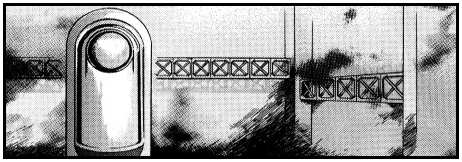
The Neurochemistry of Baroques
As addressed several times in-game, a Baroque is a distorted view of the world - a delusion - that helps a person cope with the hardships of life. For example, the Box Thing's only reason to continue living is the fantasy that his daughter lives on within his box and will one day be returned to life - something he knows deep down is false. These powerful delusions grant those who hold them a reason to go on living within the harsh, apocalyptic world of “Baroque”. But the comfort these Baroques offer is not without a cost, for those who survive through such fantasies become utterly withdrawn, sinking completely into a delusional world of their own making.
This presents a unique problem for the Archangel and the staff of the Malkuth’s cloning facility. Each clone they produce of Koriel #12 must be complacent and delusional enough to survive in this nightmare hellscape, while also being capable of feeling guilt in order to motivate them into fulfilling their redemptive mission. Since Baroques numb emotional pain, Koriel #12’s Baroque must be suppressed to a certain extent. After all, there can be no desire to improve one’s situation without first experiencing pain.
In order to attempt this delicate neurochemical balancing act, the Malkuth scientists are shown injecting each clone with cholecystokinin (CCK). According to “Baroque Report Gold”, the game’s development staff were operating under the idea that CCK has ties to memory, and therefore could be used to repress memories - specifically memories of the Dabar Fusion and the protagonist’s Baroque. The developers similarly believed that ceruletide can be used to enhance memory, which is why the scientists use it in an attempt to balance their CCK injections.
CCK is also responsible for feelings of anxiety and stress - this is likely the reason for the protagonist’s chaotic EEG readouts and the “My eyes are twitching, twitching; they won’t stop” line at the start of the game. This could also explain his dropping prolactin levels, as this hormone has been found to have anxiety-suppressing effects on the body. Koriel #12 is having his Baroque suppressed and his anxiety boosted, reducing him to a nervous wreck that is susceptible to the Archangel’s emotional manipulation. Although the scientists are careful not to overdo it, the anxiety they induce in the protagonist is unsustainable. Koriel #12’s will to survive steadily declines throughout the entire game (as depicted by his constantly draining VT meter).
In order to combat this, his artificially suppressed Baroque must be constantly reinforced through the consumption of a visual representation of his fantasies: hearts taken from the corpses of his identical clone predecessors. Perhaps he feels that he can only exist through stealing the hearts of his “brothers”; striving to reach God primarily for the purpose of correcting the surgeon’s “mistake” of choosing to save Koriel #12’s life over the life of his brother. Just like Box Thing, who is consumed by guilt and wishes he could have died instead of his daughter, Koriel #12 wishes to grant his brother a chance at life by sacrificing himself. If he succeeds in this mission, his twin will feel the same guilt and strive to perpetuate the cycle.
The anxiety vs escapism axis illustrated by Koriel #12’s neurochemical manipulation is also present in the lobotomization of God. The Archangel describes the noradrenaline they are removing from the Creator as being responsible for signaling the body to heal illness, or as he initially phrases it, "distortion". Without noradrenaline, God will have no way of knowing it is going mad, and will complacently allow the Archangel to slowly feed it delusional data. After all, it is well known that people born without the ability to feel pain often live very short lives as they have no way of detecting that their body is sustaining damage. It is exactly this state that the Archangel intends to bring about in God. Without the ability to feel pain, she won’t be able to detect the distortions that the Archangel is creating within her, and by extension, the world. Without being able to detect his tampering, there’s no way she can begin to correct it - instead cowering at the base of the Nerve Tower in the vain attempt to focus solely on not going mad. Lost in a sea of fantasy with no way of differentiating fact from fiction, she seeks to regain the ability to feel pain so that she can understand the extent of the damage and begin to repair it.
More evidence of the polarized nature of anxiety and escapism comes in the Idea Sefirah crystals produced by purifying Grotesques. You, like the other NPCs in the game, can experience the contents of these crystals by holding them. Since Grotesques think of nothing but their own delusions, you're taking these creatures’ intoxicating fantasies into yourself when you pick up their crystals. This influx of delusion is why you regain a small amount of VT when picking up the Idea Sefirot of Grotesques. The reason for the miniscule amount of VT gained through this process is stated in “Baroquism Syndrome”: people overtaken by their Baroques have very little interest in the delusions of others. This makes it nearly impossible for the protagonist to survive solely on the delusions of Grotesques. Koriel #12 is instead forced to focus inward on his own Baroque in order to find the will to carry on.
Despite the minor reinvigorating effects of reading Grotesque Baroques, you gain nothing when picking up the crystals of NPCs - likely because they're so riddled with guilt that holding these Idea Sefirot is not at all a comforting experience. Several characters, such as the ones in the outside world, will confirm that the contents of NPC crystals are not remotely pleasant. In his PS1 Guidebook interview, Yonemitsu clarifies that it is the weight of this guilt that causes NPCs to sink into the soil. It is also this guilt that makes NPC Idea Sefirot such effective throwing weapons against Grotesques. The tranquil delusions that have consumed these monstrous beings cannot withstand the devastating pain and guilt contained within these crystals. Like God, they are so numbed by their inner-fantasies that the sudden shock of experiencing negative emotions is almost always fatal. Only strong Grotesques (with their highly powerful delusions) can withstand the shock, and even then, not by much.
The "purified" states of the NPCs still containing so much suffering and emotional damage also provides subtle foreshadowing to the game's ending, in which you discover that this ugly and distorted world is, in actuality, the natural state of things.
Additional Notes
-
It is unclear what exactly GER is, or why the Malkuth are performing intracerebroventricular injections of it on the protagonist. These incredibly invasive injections are performed in order to get chemicals past the body’s natural defenses which keep foreign elements in the bloodstream out of vital areas of the body (such as the brain). To this end, these injections involve puncturing through the top of the skull and injecting fluids straight into the brain case. The only medical abbreviation I could find for GER refers to gastroesophageal reflux - essentially stomach acid.
-
Yonemitsu further expanded on the concept of NPCs sinking into the soil during one of his Baroque livestreams. He explains the process as a retreat into oneself, likening it to hikikomori (a large population of unemployed adults in Japan who live off their parents). Buried characters in Baroque are literally burying their problems and emotionally withdrawing until they become totally unresponsive to the outside world. Contrary to popular fan theories in the West, this has absolutely nothing to do with suicide. As Yonemitsu states, "it's comfortable in the soil."
|










